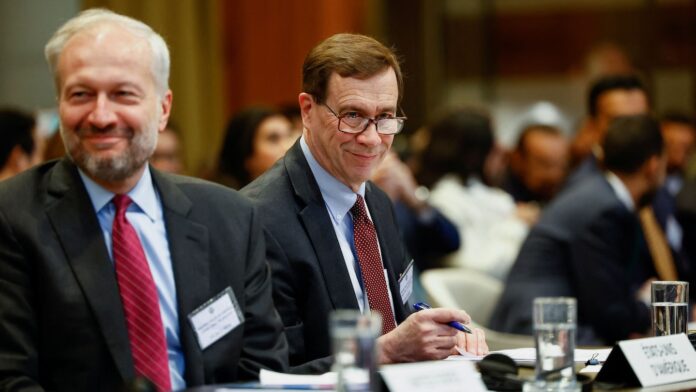The remarks came on the third day of historic hearings on Israel’s control over the West Bank, Gaza and annexed East Jerusalem. In earlier presentations, representatives from South Africa and other nations slammed Israel for running an “apartheid state” and called for an end to the occupation of Palestinian territories.
The ICJ case stems from the U.N. General Assembly’s 2022 request for an advisory opinion and predates the Oct. 7 Hamas attacks on Israel and the devastating Israel-Gaza war. It is legally distinct from the genocide case brought by South Africa against Israel late last year. But the devastation on the ground in Gaza — and the world’s inability to stop it — have loomed over the proceedings and lent a sense of urgency to the case.
The United States is increasingly isolated when it comes to Israel — and that has been evident in The Hague. The United States remains Israel’s closest ally, but faces growing pressure to change Israel’s conduct, particularly in Gaza, where 29,000 people have been killed.
Earlier this month, Biden called the Israeli military operation that began after Hamas’s attacks “over the top” and said the civilian suffering must stop.
Biden also signed an executive order that imposed sanctions on four West Bank settlers who the administration says have committed violence against Palestinians, the most significant step taken against Israelis since the conflict began — though many have called on the administration to do more.
The killing of two American teens in the West Bank has also led to calls for a stronger U.S. response.
But the Biden administration continues to back Israel in international settings. On Tuesday, the United States for the third time since the start of the conflict vetoed a Security Council resolution calling for an immediate cease-fire in the Gaza Strip.
The United States argued that an immediate cease-fire could jeopardize negotiations for a six-week pause that would see Hamas release Israeli hostages in exchange for the return of jailed Palestinians, as well as additional humanitarian aid. Instead, Linda Thomas-Greenfield, the U.S. ambassador to the United Nations, called on members to support an alternative resolution.
The United States was the only vote against the call for a cease-fire; Britain abstained and the other 15 members of the council voted in favor of the resolution for an immediate cease-fire.
In The Hague on Wednesday, Visek sought to acknowledge the U.N. court’s role while warning against the risks of “one-sidedness.”
He said the court should not find that Israel is legally obligated to immediately and unconditionally withdraw from occupied territory and stressed the need for an advisory opinion that protects Israel’s security needs.
“We were all reminded of those security needs on October 7, and they persist,” he said. “Regrettably, those needs have been ignored by many of the participants in asserting how the court should consider the questions before it.”
The proceedings opened Monday with remarks from Palestinian officials. Foreign Affairs Minister Riyadh al-Maliki told the court that “2.3 million Palestinians in Gaza, half of them children, are besieged and bombed, killed and maimed, starved and displaced.”
“More than 3.5 million Palestinians in the West Bank, including in Jerusalem, are subjected to colonization of their territory and racist violence that enables it,” he added.
Subsequent remarks from 10 additional countries on Tuesday — South Africa, Algeria, Saudi Arabia, the Netherlands, Bangladesh, Belgium, Belize, Bolivia, Brazil and Chile — drew on similar themes.
South Africa — which recently brought a separate genocide case against Israel at the ICJ — accused Israel of perpetuating a “more extreme form” of apartheid than once existed in its country.
South Africa’s ambassador to the Netherlands, Vusimuzi Madonsela, said that Israel’s occupation “discriminates against and fragments all Palestinian people to ensure the maintenance of Israeli Jewish domination.”
Canada was expected to argue before the court Tuesday, but dropped out, saying its written statement would suffice. Canada had asked the court not to issue an advisory opinion for fear it would disrupt peace efforts.
Later on Wednesday, the court hears from Russia and four other countries.
The hearings will continue through Monday with more than two dozen countries yet to speak. The court’s advisory opinion is not expected for months — and may or may not have an impact.
Last month, the court ordered Israel to take efforts to minimize civilian harm during its ongoing military operation in Gaza. However, few see evidence that these “provisional measures” have changed the conduct of the war.



